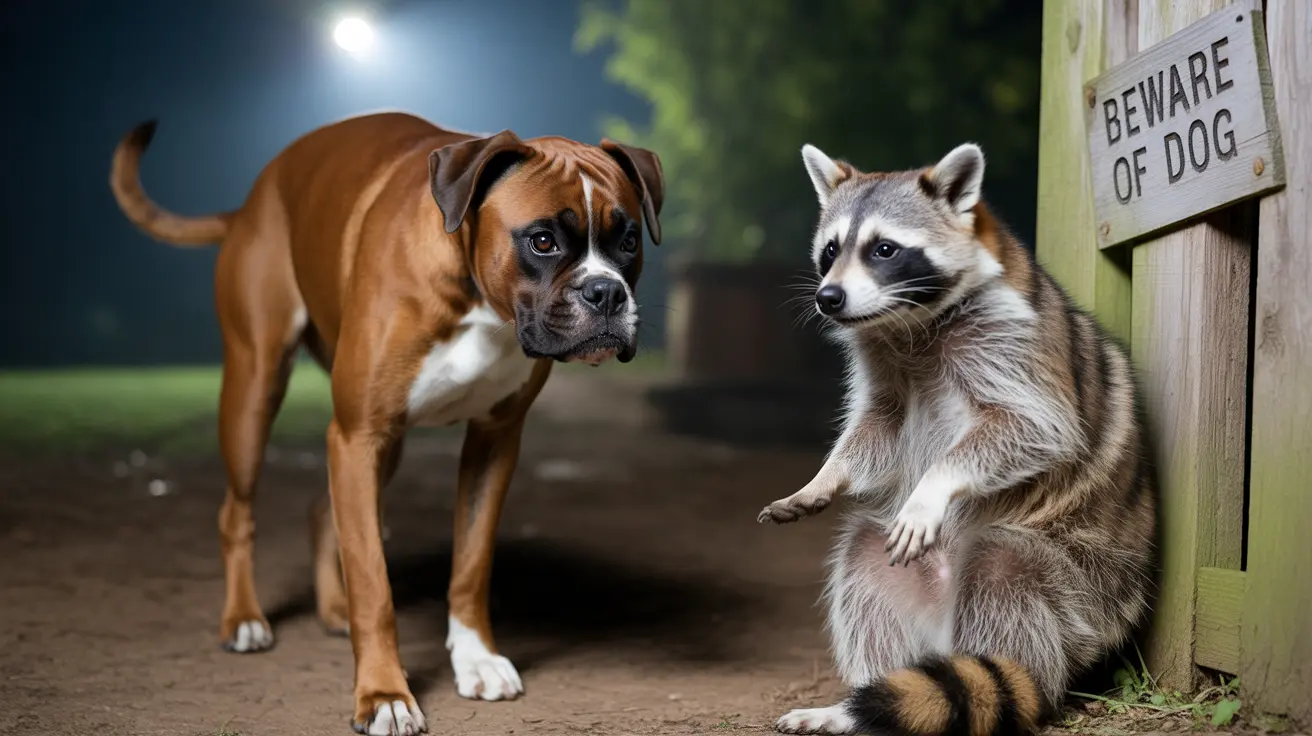Understanding Raccoon Behavior Toward Dogs
Raccoons are typically non-aggressive animals that would rather flee than fight. However, they can become formidable opponents when they feel threatened or cornered. Female raccoons with young are particularly defensive and may attack dogs that come too close to their den sites.
These masked bandits are most active during twilight and nighttime hours, which is when most dangerous encounters with dogs occur. They're surprisingly strong for their size and equipped with sharp claws and teeth that can inflict serious damage.
Potential Dangers and Injuries
When raccoons do attack dogs, the consequences can be severe, especially for smaller breeds. Their natural defensive tactics include:
- Deep bites and scratches
- Face and eye attacks
- Neck targeting
- Aggressive clawing
Larger dogs may fare better in confrontations but are still at risk of serious injuries that require immediate veterinary attention.
Disease Risks from Raccoon Encounters
Physical injuries aren't the only concern when it comes to raccoon-dog encounters. These wild animals can transmit several dangerous diseases:
- Rabies
- Leptospirosis
- Canine distemper
- Parasitic infections
- Bacterial infections from bites
Regular vaccination is essential for protecting your dog against these potentially life-threatening diseases.
Prevention Strategies
Secure Your Property
The best way to protect your dog from raccoon attacks is to prevent encounters altogether:
- Install motion-activated lights
- Secure garbage bins with animal-proof lids
- Remove outdoor pet food after feeding times
- Seal potential den sites under decks or porches
- Maintain solid fencing around your yard
Safe Walking Practices
When walking your dog, especially during dawn or dusk:
- Keep dogs leashed in areas known for raccoon activity
- Carry a flashlight for better visibility
- Avoid known raccoon habitats
- Train your dog to respond to recall commands
What to Do During a Raccoon Encounter
If you and your dog encounter a raccoon:
- Remain calm and slowly back away
- Keep your dog close and under control
- Make yourself appear large
- Avoid running, which might trigger a chase response
- Never corner or threaten the raccoon
Frequently Asked Questions
Do raccoons often attack dogs, and what triggers these attacks?
Raccoons rarely initiate attacks on dogs but will defend themselves aggressively if cornered or protecting their young. Most attacks occur when dogs chase or corner raccoons, or when they get too close to raccoon dens.
What types of injuries can raccoons inflict on dogs during a fight?
Raccoons can cause severe injuries including deep puncture wounds, lacerations, and eye injuries. They often target the face and neck areas, which can result in serious or potentially fatal wounds, especially in smaller dogs.
How can I protect my dog from raccoon encounters, especially at night?
Keep your dog indoors during peak raccoon activity hours (dusk to dawn), secure your yard with proper fencing, remove outdoor food sources, and always supervise your pet during outdoor activities.
What diseases can raccoons transmit to dogs, and how can I prevent them?
Raccoons can transmit rabies, leptospirosis, canine distemper, and various parasites. Maintain your dog's vaccinations, prevent direct contact with raccoons and their waste, and keep your yard clean of potential disease sources.
What should I do immediately if my dog is bitten or scratched by a raccoon?
Seek immediate veterinary care, even for minor-looking wounds. The veterinarian will clean and treat the wounds, assess the need for antibiotics, and verify your dog's vaccination status, particularly for rabies.
Final Thoughts
While raccoon attacks on dogs aren't common, they can have serious consequences when they occur. By understanding raccoon behavior, implementing proper prevention strategies, and knowing how to react during encounters, you can significantly reduce the risk to your beloved pet. Remember that prevention is always better than dealing with the aftermath of an attack.






